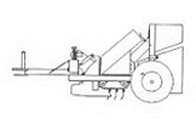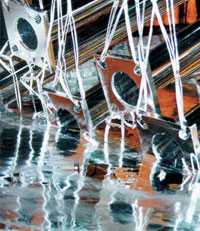|
A primary consideration for most beach cleaner purchasers is how much the machine will cost—not only in the initial purchase, but also over time. A beach cleaner’s ability to function optimally with minimal maintenance hours and costs is key to getting the job done for less. In order to help you know the right questions to ask to keep maintenance costs down over the long-haul, we’ve laid out the top five beach cleaner cost and maintenance questions to ask manufacturers. Feel free to comment and add other ones you feel are important!
Ask the manufacturer of each beach cleaner about common maintenance practices, part-replacement frequency, and the costs of major moving items, like chains and screens. 2. How much of a role does vibration play in the beach cleaner's operation? We typically equate vibration with punching your beach cleaner repeatedly where it hurts. Beach cleaners that vibrate their screens or conveyor assemblies—typically to separate sand from debris—exponentially increase the wear of the moving parts on the conveyor/screening system. The chains, especially, tend to wear much faster in beach cleaners that employ a vibrating conveyor due to increased friction from sand and metal-on-metal. This problem is exacerbated when debris, like stone, gets caught in the conveyor chains, screens, or flights, for it will literally end up vibrating holes into the components. In order to prevent such problems, you should choose a beach cleaner that does not heavily rely on vibration to get the job done. 3. What kind of corrosion protection do you offer on your machines?
Secondly, be sure not to overlook the fastening components used on the machine; such as bolts, washers, and nuts. These components should be stainless steel, as pre-mature rusting of these elements will cause larger connected components to wear more quickly.
4. How do the beach cleaners process the sand? Follow this general rule: Machines that perform more overall work will wear faster. More specifically, beach cleaning machines that lift more weight will wear faster. If the machine relies on sifting sand through a screen, it is lifting and processing tons of beach sand through its screen per cleaning. The added weight stresses the conveyor system, while the increased friction of processing tons of sand wears the screens, chains, and other moving parts. Therefore, it is no surprise that most sifting beach cleaners need to replace their screens every year. Due to this expendability and expectation, most screens are not stainless steel or built for the long-haul, so they can be an expected cost of operation. Tine-raking beach cleaners stress the machine less while removing comparable amounts of debris, because their tines comb through the sand, instead of lifting the top layer of beach onto the conveyor belt. This primarily causes the tines to wear (stainless steel ones typically last aprx. 4 yrs.) instead of the entire conveyor mechanism. While this principle should not necessarily be the basis for buying a beach cleaner, it is strong consideration when assessing the cost of maintenance. 5. What is covered by Warranty? Despite striving for the ideal balance of the above-mentioned constructional elements, all beach cleaners, and machines for that matter, wear and require maintenance/parts every now and then. You need to know what parts are covered by warranty and for how long. Many manufacturers won’t cover the moving parts that tend to wear first, because they are expected to wear. Additionally, parts orders tend to be a large part of the beach cleaning machine business, so some manufacturers may skimp on covering moving parts with warrantees in order to get more money from parts orders later on. Make sure the beach cleaner you purchase covers the majority of these items for at least a year. This can help you save thousands of dollars in maintenance costs.
14 Comments
Bob Keller
4/7/2012 09:28:04 am
Looking for a sand cleaner that goes to depth of 2' and can seperate 1/4" gravel to clean peanut fields
Reply
suvendu
2/23/2013 03:57:38 pm
We r interested to have a beach cleaning machine which will be utilised at PURI sea beach in INDIA.TRACTOR TOWED OR OTHERS MAY BE REQUIRED.so please guide us where to get this within the price written and what about the maintainance cost per year.
Reply
H Barber & Sons
2/25/2013 12:22:07 am
Good Day-- The cost of a beach cleaning machine and its normal maintenance costs vary depending on the make and use of the machine. If you would send a brief e-mail containing your contact information to [email protected], one of our team members can get in contact with you to answer your questions. Thank you for your inquiry. 11/23/2013 11:05:22 am
Hey There. I discovered your weblog the use of msn. This is a very smartly written article. I will be sure to bookmark it and come back to read extra of your useful info. Thanks for the post. I will definitely comeback.
Reply
8/16/2015 02:50:03 am
Have a beach house on Lake Erie in Wainfleet Ontario The beach while normally sandy has 1 to 2 inches of 1/2 to 3 inch stone in different locations I gave 250 ft of beach I am not looking at doing miles of beach What would be most economicAlly machine and cost Tom
Reply
8/18/2015 05:53:01 am
The cost of a beach cleaning machine and its normal maintenance costs vary depending on the make and use of the machine. If you would send a brief e-mail containing your contact information to [email protected], one of our team members can get in contact with you to answer your questions. Thank you for your inquiry.
Reply
Dean
7/18/2016 08:19:35 am
Looking for a machine to clean shells off the beach in Minnesota
Lumesh Desai
8/12/2016 01:55:56 am
Please let me no the price of the surf rake machine & maintanance cost per month & service in Mumbai
Reply
James
4/30/2017 06:25:40 am
need to clean up small beaches, was looking at tractor driven surf rake cleaner, pls let me know the price and other costs involved.and how many days till delivery,
Reply
5/1/2017 01:04:10 pm
Hello,
Reply
Cam Girdwood
7/21/2018 08:05:56 pm
Interested in starting a business in Ausralia.
Reply
1/22/2019 07:32:14 pm
With a beach cleaner, you should know that you have to do maintenance on it as you go. As you said here, there are many moving parts which can turn into many problems. However, I would just be sure that the cleaning is done by a professional.
Reply
Sulfikar
5/27/2021 08:00:59 pm
An advanced beac cleaning system
Reply
Leave a Reply. |
This blog is managed by H. Barber & Sons. Founded in 1966, Barber is the world leader in beach cleaner production and authority on beach cleaning practices. This site and blog have been compiled to provide information about beach cleaners--their methods of cleaning, importance, and many applications.
Please direct any questions our way using the 'Contact Us' form. Thanks! Archives
June 2014
Categories
All
|


 RSS Feed
RSS Feed
